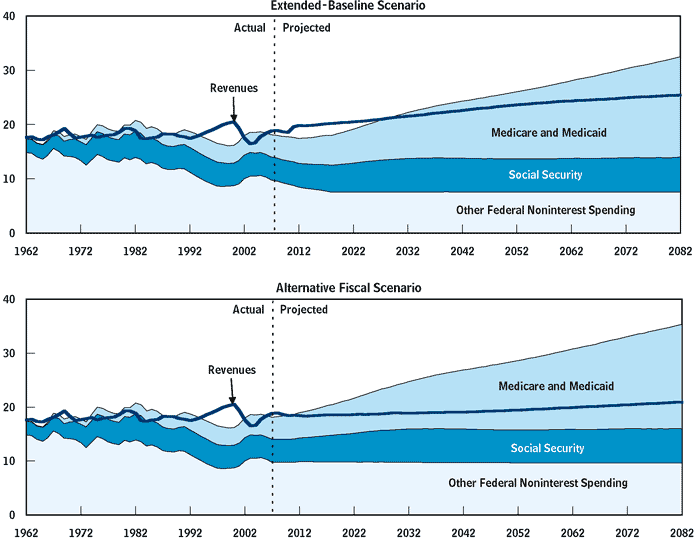No, Repealing Obamacare Will Not Increase the Deficit
Asked by Rep. Paul Ryan to score the health care reform repeal bill, the CBO found that it would reduce net spending by $540 billion over ten years:
The Congressional Budget Office, in an email to Capitol Hill staffers obtained by the Spectator, has said that repealing the national health care law would reduce net spending by $540 billion in the ten year period from 2012 through 2021. That number represents the cost of the new provisions, minus Medicare cuts. Repealing the bill would also eliminate $770 billion in taxes. It’s the tax hikes in the health care law (along with the Medicare cuts) which accounts for the $230 billion in deficit reduction.
In short, once the accounting gimmicks and taxes that kick in long before the ‘benefits’ are removed, the illusion of deficit reduction goes with it. That was obvious all along, but it’s nice to see that, when not forced to pretend Congressional sleight-of-hand is real, the CBO confirms it.







Odd that the CBO’s public release on this issue is entirely different than some “email” sent out to House staffers.
http://www.cbo.gov/ftpdocs/120xx/doc12040/01-06-PPACA_Repeal.pdf
“Consequently, over the 2012–2021 period, the effect of H.R. 2 on federal deficits as a result of changes in direct spending and revenues is likely to be an increase in the vicinity of
$230 billion, plus or minus the effects of technical and economic changes
to CBO’s and JCT’s projections for that period. ”
When the CBO releases this other assessment, I think that you have a better case. Until then, one can only go on what the CBO is actually saying.
I’m not sure how “raising money to pay for increased services” is somehow congressional sleight of hand.
That would be why I said “accounting gimmicks and taxes,” not just “taxes.” I’m sure I don’t need to belabour the well-documented double-counting and other fiscal gimmickry in the bill.
But your headline says repealing the law will not increase the deficit when the letter from the CBO is saying it clearly will (because repeal will remove the increased taxes that are a part of the law). You might not like how ObamaCare goes about reducing the deficit but the CBO is still saying it will.
It looks like that the Spectator got their facts wrong. The CBO report say it would add 230 billion(roughly) in spending to repeal it. The Spectator “report” says that there’s 530 billion cut, but the Gov loses 770 billion in taxation. That would be in line with the 230 billion increase in the deficit, but the Spectator is reporting it as a net reduction somehow.
Whether removing the tax hikes the government is counting on now for current spending but which was included in Obamacare really ought to be counted as increasing the deficit due to repeal of health care reform is more of a metaphysical question than an economic one. Yes, repeal would include those tax hikes, but they were front-loaded years before the actual benefits of the bill for no other purpose than to reduce the 10-year CBO estimate of the bill’s cost; they aren’t “paying for” HCR.
So, while my headline overstates the linked piece from the administration’s POV, the Spectator piece is not incompatible with the CBO letter.
Dodd, you’re going to have to show how repeal specifically wouldn’t touch the taxation leading to the increase in revenue otherwise you are just flat wrong. Repeal would repeal those tax increases, thus removing the revenue(unless you can specifically show otherwise).
Its pretty clear that someone misled the Spectator or the Spectator didn’t bother to check the math. 530-770=-230. And you’re going to have to show how there’s either 230 billion(and 1 cent) or 460 billion in taxation that would survive repeal to prove that there’s deficit reduction.
From Krugman’s March 27 New York Times blog post:
Claims that the plan is window-dressed to look good in its first decade only to go sour later might sound plausible — except for the fact that the CBO projects *bigger deficit-reduction in the second decade* of the reform than in the first decade, something that wouldn’t happen if lots of costs were being hidden by being pushed off into the future.
*correction: 540-770=-230. My bad.
Dodd- You are just flat out wrong and have interpreted this piece incorrectly. You are conflating spending and the deficit.
Read this.
Not sure why you would choose to dig in and continue to claim the Spectator piece demonstrates that the deficit would not increase, when that isn’t what it said at all.
Dodd — Your headline doesn’t just overstate something, it makes a factual claim that is incorrect.
Wow, another case of Dodd as right wing noise machine echo chamber. What are the odds?
100%.
Honestly, that wasn’t what I meant to do. Perhaps I’m not conveying the the distinction I’m drawing between Obamacare and the bill itself clearly enough. There’s an inherent disconnect between tax increases we’re already paying and the benefits HCR promises three or more years down the road.
Yes, repealing a tax increase lowers static revenue. But those taxes are not paying for Obamacare and cannot therefore reasonably be considered a product of health care reform. If Congress passes a tax increase in a bill to build a new post office, and later decides to repeal the bill and not to build the post office, that would be scored by this logic as raising the deficit. But not spending money to build a post office lowers spending, not the other way around.
There’s nothing in the history of government programs that would lead a rational person to actually believe that HCR will lower the deficit in the long-term. Even allowing for the double-counting of revenue, ignoring the inevitable renewal of the “doc fix,” and otherwise taking HCR’s accounting tricks with a straight face, that strains credulity beyond the breaking point, no matter what the projections the CBO was required to accept at face value when they scored it. $540 billion in net spending reductions is more likely than not to turn out to be an underestimate.
So, as a categorical matter, repealing the tax increases ought to be considered a distinct from increasing the spending — at the very minimum to the extent those tax hikes aren’t actually being used for HCR (as is the case right now). Ignore every other accounting gimmick in HCR and just remove the next three years of taxes only “connected” to Obamacare by virtue of the fact that they were included in that bill and that alleged $230 billion gap ‘from’ health care reform will disappear.
Let me put the foregoing as succinctly as possible: Repealing PPACA will increase the deficit compared to leaving it in place as scored now. Repealing Obamacare won’t.
Wrong. It collects more in taxes than it spends. Some of your other claims are wrong also.Double counting is not done by the CBO when they score the bill. It is a politically convenient claim made by those who support the bill.
Steve
Dodd: stop trying to cherry pick. The House bill is to repeal PPACA and the follow up bill together. So, you’re still wrong.
Let me put the foregoing as succinctly as possible: Repealing PPACA will increase the deficit compared to leaving it in place as scored now. Repealing Obamacare won’t.
James Joyner should be embarrassed to employ you. Only in your own mind are these two things not literally equivalent. The net result for non-legal eagles reading your headline and story is the false conclusion “Repealing PPACA doesn’t increase the deficit”. Your philosophical BS aside, the tax increases and the rest of the program were all in one giant bill together, and the law the republicans are passing repeals the whole thing. Some fictional alternative in your own head would not increase the deficit, but no one’s going to understand that distinction in your misleading headline.
You are a net loss to political knowledge in this country. I wish someone would fire you, or you would learn where the line is and how to respect it.
I’m very sorry I disappointed you. I’m also sorry that my acknowledging that repealing PPACA would increase the deficit but also pointing out that the issue is more nuanced than that makes you feel that you must attack me personally.